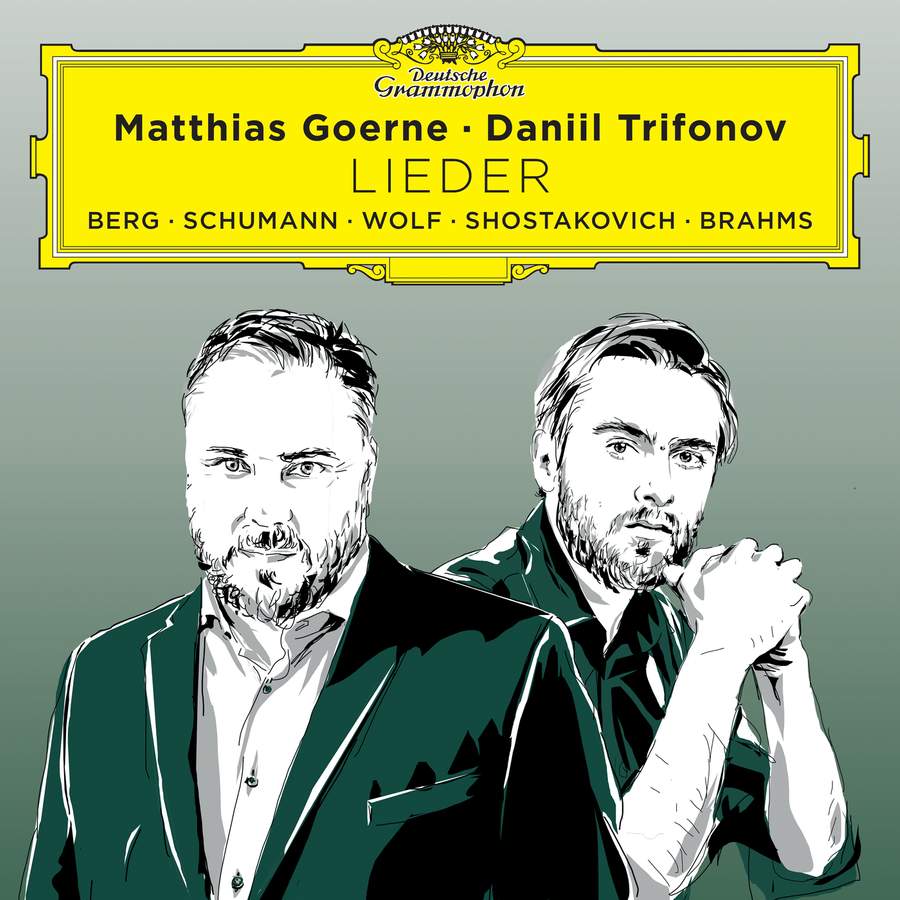Lieder: Berg, Schumann, Wolf, Shostakovich, Brahms (Matthias Goerne)
View record and artist detailsRecord and Artist Details
Composer or Director: Daniil Trifonov
Genre:
Vocal
Label: Deutsche Grammophon
Magazine Review Date: 10/2022
Media Format: CD or Download
Media Runtime: 80
Mastering:
DDD
Catalogue Number: 486 2452

Tracks:
| Composition | Artist Credit |
|---|---|
| (4) Lieder |
Arnold Schoenberg, Composer
Daniil Trifonov, Composer Matthias Goerne, Baritone |
| Dichterliebe |
Robert Schumann, Composer
Daniil Trifonov, Composer Matthias Goerne, Baritone |
| (3) Gedichte von Michelangelo |
Hugo (Filipp Jakob) Wolf, Composer
Daniil Trifonov, Composer Matthias Goerne, Baritone |
| Suite on Verses of Michelangelo |
Dmitri Shostakovich, Composer
Daniil Trifonov, Composer Matthias Goerne, Baritone |
| (4) Ernste Gesänge, 'Four Serious Songs' |
Johannes Brahms, Composer
Daniil Trifonov, Composer Matthias Goerne, Baritone |
Author: Richard Wigmore
The transience of human existence is the leitmotif of Matthias Goerne’s latest recital, charting a journey from sleep and oblivion (Berg’s Op 2), through Schumann’s dream-haunted cycle of lost love, to Brahms’s bleakly compassionate meditation on last things. Schumann provides vignettes of remembered or illusory happiness. But gloomy introspection prevails. And no lieder singer today does profound, often tortured inwardness like Matthias Goerne. His velvet, darkly rounded baritone is a seductive instrument per se; and as ever, he uses it scrupulously, moulding seamless legato lines like a master cellist, with never a bump or wrinkle in the tone. From the opening Berg song, growing from somnolence to anguished declamation, Goerne gives an object lesson in fusing evenness of line with expressive, unexaggerated enunciation of the text: no gratuitous emphases, no sudden pouncing on unsuspecting individual words or syllables.
Leaving minimal gaps between the groups, Goerne and the equally probing Daniil Trifonov – a true conversational partner – seem to conceive the whole programme as a brooding mega-cycle on the human condition. So the feverish close of Berg’s virtually atonal ‘Warm die Lüfte’, for which Goerne summons an unsuspected power, is confronted with barely a break by the trancelike reverie of ‘Im wunderschönen Monat Mai’. Not for the only time in Dichterliebe, Goerne chooses an ultra-slow tempo, four rather than two in a bar, and several notches slower than in his 1997 recording with Vladimir Ashkenazy (Decca, 5/98). It’s all wrong in theory, yet Goerne compels with his beauty of line and rueful tenderness of expression.
The baritone can erupt in sardonic fury – in ‘Ich grolle nicht’, ballasted by the depth and weight of Trifonov’s accompaniment (while Goerne takes Schumann’s lower option near the end, he and Trifonov ensure that the climax properly tells), or the self-lacerating mordancy of ‘Das ist ein Flöten und Geigen’, where Goerne adds a hard edge to his tone without compromising vocal production. Yet with singer and pianist exploiting the furthest recesses of pp and ppp, the predominant impression is of melancholy, dreamlike resignation, a Dichterliebe set in the distant past tense – in extreme contrast to, say, the neurotic, dramatic Fischer-Dieskau. The healing postlude of the final song is exquisitely voiced and timed by Trifonov.
The bass underlay to Goerne’s baritone pays rich dividends in the Wolf, Shostakovich and Brahms songs: a slow and sombre sequence if ever there was, yet sung and played with such concentrated intensity as to silence misgivings. Few duos have caught so uncannily the gedämpft (‘muted’) secrecy of the second of Wolf’s mighty Michelangelo Lieder or paced the final song so unerringly towards its radiant apotheosis.
Goerne’s timbre and diction sound convincingly idiomatic in the mingled protest and desolation of three songs from Shostakovich’s starkly minimalist Michelangelo suite. Even more than in his fine recording with Christoph Eschenbach (Harmonia Mundi, 9/16), Goerne’s Vier ernste Gesänge are marked above all by tenderness and restraint, enhanced by the colouristic and rhythmic subtlety of Trifonov’s pianism. The vaulting climax of No 2 is elegiac rather than, as so often, impassioned, while the opening of No 3, ‘O Tod’, is sadly resigned, devoid of accusatory bitterness. As always, Goerne thinks in long, arching lines, epitomised by the benedictory close of No 3, and the final reflection on the redeeming power of love, whose inwardness and unblemished beauty of line stand as an epitaph to a magnificent recital.
Discover the world's largest classical music catalogue with Presto Music.

Gramophone Digital Club
- Digital Edition
- Digital Archive
- Reviews Database
- Full website access
From £8.75 / month
Subscribe
Gramophone Full Club
- Print Edition
- Digital Edition
- Digital Archive
- Reviews Database
- Full website access
From £11.00 / month
Subscribe
If you are a library, university or other organisation that would be interested in an institutional subscription to Gramophone please click here for further information.




